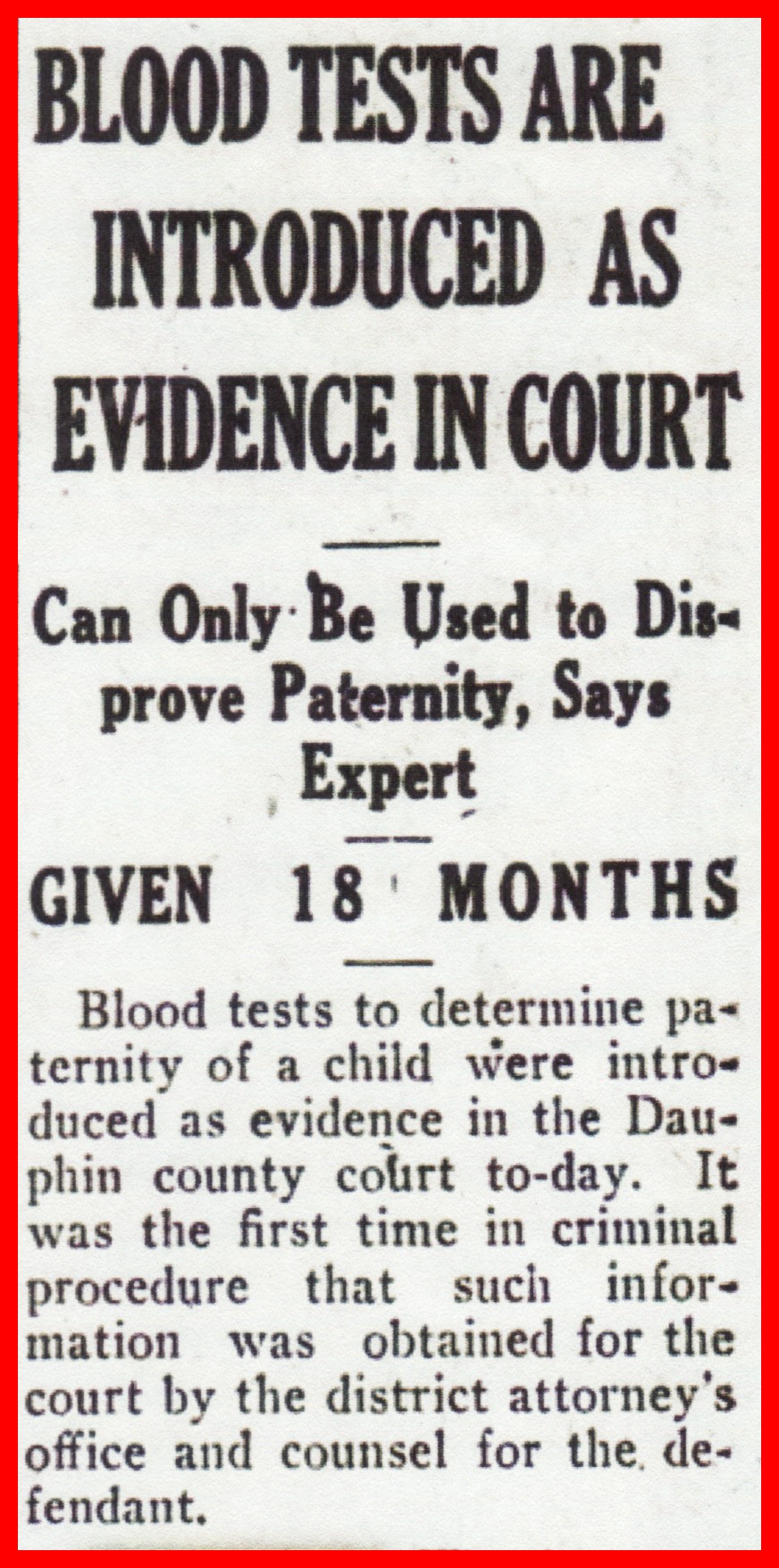Articles in the Harrisburg newspapers in August 1926 chronicled the results of the trial of George Dieter, of Wiconisco, who was accused of assaulting his step-daughter and with being the father of her baby. The case was historic because it was the first time that blood tests had been used in a Dauphin County criminal court proceeding to attempt to disprove parentage.
From the Harrisburg Evening News, 9 June 1926:
VERDICT SOON IN ASSAULT CASE
A verdict is expected late today in Dauphin County criminal court in the case of George Dieter, Wiconisco miner, who is charged with assaulting his 14-year-old stepdaughter and with being the father of the girl’s baby.
Dieter denies both charges. He and his wife, the mother of the prosecutrix, have been estranged before Dieter’s arrest.
From the Harrisburg Evening News, 16 August 1926:
Blood Tests Used in Effort to Show Child’s Paternity; Defendant is Sent to Pen
Blood tests to determine the paternity of a child figured today in the Dauphin County criminal courts for the first time but failed to save George Dieter, of Wiconisco, in whose defense the tests were made, from the penitentiary.
In June criminal court Dieter was convicted of having criminal relations with his 13-year-old stepdaughter and with being the father of the girl’s baby.
At the request of Dieter’s counsel, the court granted a stay of sentence until blood tests could be take to determine the paternity of the child.
Dr. George R. Moffitt, city bacteriologist, made tests of the blood of Dieter, his step-daughter and the latter’s baby and presented his report to the court today.
The report said that all three of the principals in the case have blood of the same type. Dr. Moffitt explained that “typing can rule out paternity but cannot prove it.”
He said that there are four types of human blood, and that the child always possessed the type of one of the parents.
The chemist said that had the child’s type been different from those of its mother and Dieter that would have been proof that Dieter was not its father. On the other hand, he stated, the fact that in this case all three persons have the same blood type does not prove Dieter to be the father of the child.
After receiving the report of the blood tests President Judge Hargest sentenced Dieter to serve from eighteen months to three years in the Eastern Penitentiary on the charge, involving his step-daughter, who is a daughter of Dieter’s wife by a former marriage.
From the Harrisburg Telegraph, 16 August 1926:
BLOOD TESTS ARE INTRODUCED IN COURT
Can Only Be Used to Disprove Paternity, Says Expert
GIVEN 18 MONTHS
Blood tests to determine paternity of a child were introduced as evidence in the Dauphin County court today. It was the first time in criminal procedure that such information was obtained for the court by the district attorney’s office and counsel for the defendant.
George Dieter, Wiconisco, was convicted in the June court on a charge of criminally assaulting his 13-year old stepdaughter… and was the alleged father of her baby boy.
Thomas D. Caldwell, his counsel, obtained postponement of sentence in order to have tests made of the blood of the mother, the child and the reputed father.
Today these were submitted to the court by Assistant District Attorney Keen. They showed that the three persons were in the same group, and added to the presumption of guilt of the man, according to the court, although they could not be said to prove it conclusively.
Such tests cannot be used to prove paternity of a child, but can be used to disprove it, Dr. George R. Moffitt, city bacteriologist, who made the examinations, said in his report to the court.
He explained that there are four types of human blood. If the parents of a child fall within one type, their offspring will be in the same group. But if the husband and wife are in group no. 1 and the blood of the child is in another, the husband is not the father, the chemist advised.
Dieter was given a term of eighteen months to three years in the Eastern Penitentiary, dating from June 9.
____________________________
Corrections and additional information should be added as comments to this post.
